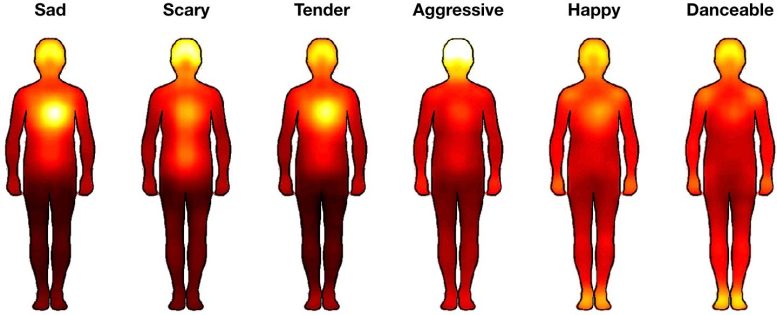Music’s Global Language of Emotion


A recent study demonstrated that music universally triggers similar emotional responses and bodily sensations, irrespective of cultural background. The research indicates that different types of music, such as those evoking happiness or sadness, generate distinct physical sensations, such as feelings in the arms and legs or chest area, respectively. The findings suggest that these reactions are likely driven by innate biological mechanisms rather than cultural influences.
A study shows music evokes consistent emotional and physical responses globally, driven by inherent biological mechanisms, not culture. Music influences feelings in different body parts based on the emotion it conveys, supporting its role in social bonding.
New research shows that music evokes similar emotions and bodily sensations around the world. The study, by the Turku PET Centre in Finland, was published in the Proceedings of the National Academy of Sciences.
Music can be felt directly in the body. When we hear our favorite catchy song, we are overcome with the urge to move to the music. Music can activate our autonomic nervous system and even cause shivers down the spine. A new study from the Turku PET Centre in Finland shows how emotional music evokes similar bodily sensations across cultures.

Music evokes similar emotions and bodily sensations in Western and Asian listeners. Credit: Lauri Nummenmaa, University of Turku
Cross-Cultural Emotional Responses to Music
“Music that evoked different emotions, such as happiness, sadness or fear, caused different bodily sensations in our study. For example, happy and danceable music was felt in the arms and legs, while tender and sad music was felt in the chest area,” explains Academy Research Fellow Vesa Putkinen.
The emotions and bodily sensations evoked by music were similar across Western and Asian listeners. The bodily sensations were also linked with the music-induced emotions.
Music as a Social and Evolutionary Tool
“Certain acoustic features of music were associated with similar emotions in both Western and Asian listeners. Music with a clear beat was found happy and danceable while dissonance in music was associated with aggressiveness. Since these sensations are similar across different cultures, music-induced emotions are likely independent of culture and learning and based on inherited biological mechanisms,” says Professor Lauri Nummenmaa.
“Music’s influence on the body is universal. People move to music in all cultures and synchronized postures, movements, and vocalizations are a universal sign of affiliation. Music may have emerged during the evolution of the human species to promote social interaction and sense of community by synchronizing the bodies and emotions of the listeners,” continues Putkinen.
Reference: “Bodily maps of musical sensations across cultures” by Vesa Putkinen, Xinqi Zhou, Xianyang Gan, Linyu Yang, Benjamin Becker, Mikko Sams and Lauri Nummenmaa, 25 January 2024, Proceedings of the National Academy of Sciences.
DOI: 10.1073/pnas.2308859121
The study was conducted in collaboration with Aalto University from Finland and the University of Electronic Science and Technology of China (UESTC) as an online questionnaire survey. Altogether 1,500 Western and Asian participants rated the emotions and bodily sensations evoked by Western and Asian songs.
The study was funded by the Research Council of Finland.



